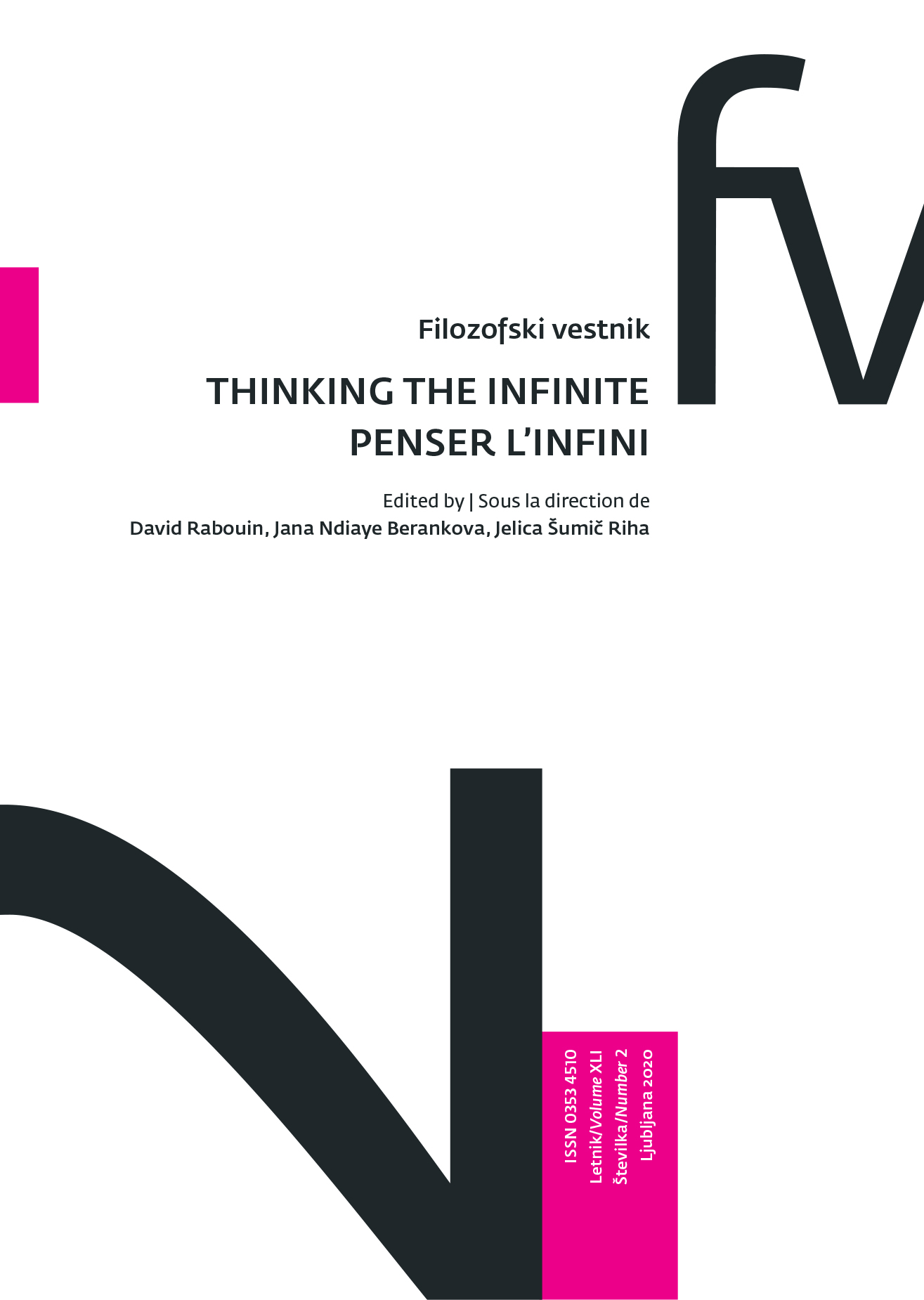Do konca: razkrivanje absoluta
DOI:
https://doi.org/10.3986/fv.41.2.12Ključne besede:
absolut, videz, Badiou, bit, izsiljenje, svoboda, resnic(e)Povzetek
Pričujoči prispevek rekonstruira celotno Badioujevo delo, izhajajoč iz zadnjega dela trilogije Biti in dogodka. Opredeli perspektivo in nalogo Imanence resnic in pokaže, kako je lahko »absolutna ontologija« rezultat dejanja izsiljenja, ki je hkrati mera za resničnost resnice. Na tej podlagi lahko nato zatrdimo, da je Badioujeva filozofija, kar je vedno tudi bila, filozofija svobode.
Prenosi
Literatura
Badiou, Alain, “The Ethics of Truth: Construction and Potency”, in Pli 12 (2001), pp.
–255
— “Beyond Formalization. An Interview”, in Angelaki. Journal of the Theoretical
Humanities, 8 (2/2003), pp. 111–133
— Le concept de modèle. Introduction à une épistémologie matérialiste des mathématiques,
Fayard, Paris 2007
— Theory of the Subject, trans. B. Bosteels, Continuum, London/New York 2009
— Logics of Worlds, Being and Event, 2, trans. A. Toscano, Continuum, London / New
York 2009
— Le fini et l’infini, Bayard Culture, Paris 2010
— “Conférence de Ljubljana”, in Filozofski Vestnik, 32 (2/2012), pp. 7–24
— “Dix-neuf réponses à beaucoup plus d’objections”, in Entretien 1. 1981–1996, Nous,
Paris 2011, pp. 59–80
— “L’entretien de Bruxelles”, in Entretien, pp. 81–110
— “Philosophie & Politique”, in Entretiens, pp. 125–140
— “L’être en nombres”, in Entretien, pp. 167–196
— The Rational Kernel of the Hegelian Dialectic, re.press, Melbourne 2011
— Being and Event, trans. O. Feltham, Bloomsbury, London / New York 2013
— Le séminaire – Images du temps présent: 2001–2004, Fayard,Paris 2014
— “Toward a New Thinking of the Absolute”, in Crisis and Critique, Special Issue, 1
(2/2014), pp. 19–24
— In Praise of Mathematics, trans. S. Spitzer, Polity Press, London 2016
— Le séminaire – L’un: Descartes, Platon, Kant (1983–1984), Fayard, Paris 2016
— L’Immanence des vérités. L’être et l’événement, 3, Fayard, Paris 2018
— Can Politics Be Thought?, trans. B. Bosteels, Duke University Press, Durham / London
Benjamin, Walter, “Ein Jakobiner von heute. Zu Werner Hegemanns ‚Das steinerne Berlin’”,
in Gesammelte Schriften, Vol. 3, Suhrkamp, Frankfurt am Main 1991, pp. 260–265
Comay, Rebecca and Ruda, Frank, The Dash – The Other Side of Absolute Knowing, MIT
Press, Cambridge 2018
Hegel, G. W. F., Science of Logic, trans. G. Di Giovanni, Cambridge University Press,
Cambridge 2010
Nagel, Thomas, “What Is It Like to Be a Bat?”, in The Philosophical Review, 83 (4/1974),
pp. 435–450
— A View from Nowhere, Oxford University Press, Oxford 1986
Riha, Rado, Kant in Lacan’scher Absicht: Die kopernikanische Wende und das Reale,
Turia+Kant, Vienna 2018
Ruda, Frank, For Badiou. Idealism without Idealism, Northwestern University Press,
Evanston
— Abolishing Freedom. A Plea for a Contemporary Use of Fatalism, Nebraska University
Press, Lincoln 2016
— “Hegel’s Immanence of Truths”, in Badiou and German Philosophy, ed. by Jan Völker,
London, Bloomsbury, 2019, pp. 51–69
— “Tovariši absoluta, ali: Kje je “auprès de nous?””, in Problemi, (3–4/2019), pp. 133–150
Sartre, Jean-Paul, Search for a Method, trans. H.E. Barnes, Knopf, New York 1963
Woodin, W. Hugh, “The Realm of the Infinite”, in Infinity: New Research Frontiers, ed. by
Michael Heller and W. Hugh Woodin, Cambridge University Press, New York 2011, pp.
–118
Žižek, Slavoj, Ruda, Frank, Hamza, Agon, Reading Marx, Polity Press, London 2018
Prenosi
Objavljeno
Kako citirati
Številka
Rubrike
Licenca
Avtorji jamčijo, da je delo njihova avtorska stvaritev, da v njem niso kršene avtorske pravice tretjih oseb ali kake druge pravice. V primeru zahtevkov tretjih oseb se avtorji zavezujejo, da bodo varovali interese založnika ter da bodo povrnili morebitno škodo.
Podrobneje v rubriki: Prispevki





